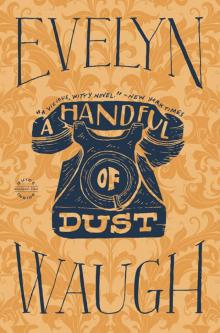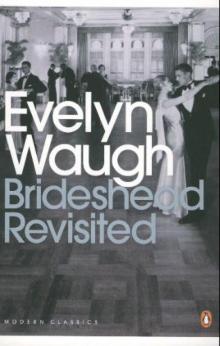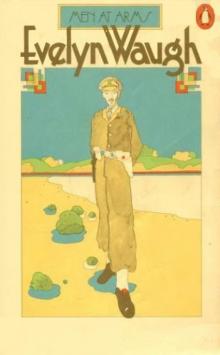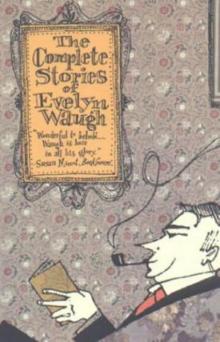- Home
- Evelyn Waugh
Officers and Gentlemen Page 8
Officers and Gentlemen Read online
Page 8
‘I don’t know how to fetch him, Colonel.’
‘All right, go out to C troop and take over Ian’s section. Guy, you’re assistant adjutant. Go and get your man. Don’t stand there like Bertie. See the harbour-master, get a lifeboat, get moving.’
‘I’ve also got a three-ton lorry, shall I bring that?’
‘Yes, of course. Wait.’
Guy recognized the look of the professional soldier, as he had seen it in Jumbo, overclouding Tommy’s face. The daemon of caution by which the successful are led, was whispering: ‘Don’t go too far. You won’t get away with a lorry.’
‘No,’ he said. ‘Leave the lorry and bring the naval candidate.’
8
NEITHER character nor custom had fitted Trimmer to the life of a recluse. For a long time now he had been lying low doing nothing to call himself to the notice of his superiors. He had not reported the condition of his piece of artillery. So far there had been no complaints. His little detachment were well content; Trimmer alone repined as every day his need for feminine society became keener. He was in funds, for he was not admitted to the gambling sessions at the hotel. He was due for leave and at last he took it, seeking what he called ‘the lights’.
Glasgow in November 1940 was not literally a ville lumière. Fog and crowds gave the black-out a peculiar density. Trimmer, on the afternoon of his arrival, went straight from the train to the station hotel. Here too were fog and crowds. All its lofty halls and corridors were heaped with luggage and thronged by transitory soldiers and sailors. There was a thick, shifting mob at the reception office. To everybody the girl at the counter replied: ‘Reserved rooms only. If you come back after eight there may be some cancellations.’
Trimmer struggled to the front, leered and asked: ‘Have ye no a wee room for a Scottish laddie?’
‘Come back after eight. There may be a cancellation.’
Trimmer gave her a wink and she seemed just perceptibly responsive, but the thrust of other desperate and homeless men made further flirtation impossible.
With his bonnet on the side of his head, his shepherd’s crook in his hand and a pair of major’s crowns on his shoulders (he had changed them for his lieutenant’s stars in the train lavatory), Trimmer began to saunter through the ground floor. There were men everywhere. Of the few women each was the centre of a noisy little circle of festivity, or else huddled with her man in a gloom of leave-taking. Waiters were few. Everywhere he saw heads turned and faces of anxious entreaty. Here and there a more hopeful party banged the table and impolitely shouted: ‘We want service.’
But Trimmer was undismayed. He found it all very jolly after his billet on Mugg and experience had taught him that anyone who really wants a woman, finds one in the end.
He passed on with all the panache of a mongrel among the dustbins, tail waving, ears cocked, nose a-quiver. Here and there in his passage he attempted to insinuate himself into one or other of the heartier groups, but without success. At length he came to some steps and the notice: CHATEAU de MADRID. Restaurant de grand luxe.
Trimmer had been to this hotel once or twice before but he had never penetrated into what he knew was the expensive quarter. He took his fun where he found it, preferably in crowded places. Tonight would be different. He strolled down rubber-lined carpet and was at once greeted at the foot of the stairs by a head waiter.
‘Bon soir, monsieur. Monsieur has engaged his table?’
‘I was looking for a friend.’
‘How large will monsieur’s party be?’
‘Two, if there is a party. I’ll just sit here a while and have a drink.’
‘Pardon, monsieur. It is not allowed to serve drinks here except to those who are dining. Upstairs…’
The two men looked at one another, fraud to fraud. They had both knocked about a little. Neither was taken in by the other. For a moment Trimmer was tempted to say: ‘Come off it. Where did you get that French accent? The Mile End Road or the Gorbals?’
The waiter was tempted to say: ‘This isn’t your sort of place, chum. Hop it.’
In the event Trimmer said: ‘I shall certainly dine here if my friend turns up. You might give me a look at the menu while I have my cocktail.’
And the head waiter said: ‘Tout suite, monsieur.’
Another man deprived Trimmer of his bonnet and staff.
He sat at the cocktail bar. The decoration here was more trumpery than in the marble and mahogany halls above. It should have been repainted and re-upholstered that summer, but war had intervened. It wore the air of a fashion magazine, once stiff and shiny, which too many people had handled. But Trimmer did not mind. His acquaintance with fashion magazines had mostly been in tattered copies.
Trimmer looked about and saw that one chair only was occupied. Here in the corner was what he sought, a lonely woman. She did not look up and Trimmer examined her boldly. He saw a woman equipped with all the requisites for attention, who was not trying to attract. She was sitting still and looking at the half-empty glass on her table and she was quite unaware of Trimmer’s brave bare knees and swinging sporran. She was, Trimmer judged, it her early thirties; her clothes – and Trimmer was something of a judge – were unlike anything worn by the ladies of Glasgow. Less than two years ago they had come from a grand couturier. She was not exactly Trimmer’s type but he was ready to try anything that evening. He was inured to rebuffs.
A sharper eye might have noted that she fitted a little too well into her surroundings – the empty tank which had lately been lit up and brilliant with angel fish; the white cordings on the crimson draperies, now a little grimy, the white plaster sea-horses, less gay than heretofore – the lonely woman did not stand out distinct from these. She sat, as it were, in a faint corroding mist – the exhalation perhaps of unhappiness or ill health, or of mere weariness. She drained her glass and looked past Trimmer to the barman who said: ‘Coming up right away, madam,’ and began splashing gin of a previously unknown brand into his shaker.
When Trimmer saw her face he was struck by a sense of familiarity; somewhere, perhaps in those shabby fashion-magazines, he had seen it before.
‘I’ll take it over,’ he said to the barman, quickly lifting the tray with the new cocktail on it.
‘Excuse me, sir, if you please.’
Trimmer retained his hold. The barman let go. Trimmer carried the tray to the corner.
‘Your cocktail, madam,’ he said jauntily. The woman took the glass, said ‘Thank you’ and looked beyond him. Trimmer then remembered her name.
‘You’ve forgotten me, Mrs Troy?’
She looked at him slowly, without interest.
‘Have we met before?’
‘Often. In the Aquitania.’
‘I’m sorry,’ she said.’ I’m afraid I don’t remember. One meets so many people.’
‘Mind if I join you?’
‘I am just leaving.’
‘You could do with a rinse and set,’ said Trimmer, adding in the tones of the maître d’hôtel, ‘Madam’s hair is un peu fatigué, n’est ce-pas? It is the sea-air.’
Her face showed sudden interest, incredulity, welcome.
‘Gustave! It can’t be you?’
‘Remember how I used to come to your cabin in the mornings? As soon as I saw your name on the passenger list I’d draw a line through all my eleven-thirty appointments. The old trouts used to come and offer ten-dollar tips but I always kept eleven-thirty free in case you wanted me.’
‘Gustave, how awful of me! How could I have forgotten? Sit down. You must admit you’ve changed a lot.’
‘You haven’t,’ said Trimmer. ‘Remember that little bit of massage I used to give you at the back of the neck. You said it cured your hangovers.’
‘It did.’
They revived many fond memories of the Atlantic.
‘Dear Gustave, how you bring it all back. I always loved the Aquitania.’’
‘Mr Troy about?’
‘He’s in America.’
‘I came to see a friend off.’
‘Boyfriend?’
‘You always were too damned fresh.’
‘You never kept any secrets from me.’
‘No great secret. He’s a sailor. I haven’t known him long but I liked him. He went off quite suddenly. People are always going off suddenly nowadays, not saying where.’
‘You’ve got me for a week if you’re staying on.’
‘I’ve no plans.’
‘Nor me. Dining here?’
‘It’s very expensive.’
‘My treat, of course.’
‘My dear boy, I couldn’t possibly let you spend your money on me. I was just wondering whether I could afford to stand you dinner. I don’t think I can.’
‘Hard up?’
‘Very. I don’t quite know why. Something to do with Mr Troy and the war and foreign investments and exchange control. Anyway, my London bank manager has suddenly become very shifty.’
Trimmer was both shocked and slightly exhilarated by this news.
The barrier between hairdresser and first-class passenger was down. It was important to start the new relationship on the proper level – a low one. He did not fancy the idea of often acting as host at the Chateau de Madrid.
‘Anyway, Virginia, let’s have another drink here?’
Virginia lived among people who used Christian names indiscriminately. It was Trimmer’s self-consciousness which called attention to his familiarity.
‘Virginia?’ she said, teasing.
‘And I, by the way, am Major McTavish. My friends call me “Ali” or “Trimmer”.’
‘They know about your being a barber, then?’
‘As a matter of fact they don’t. The name Trimmer has nothing to do with that. Not that I’m ashamed of it. I got plenty of fun on the Aquitania, I can tell you – with the passengers. You’d be surprised, if I told you some of the names. Lots of your own set.’
‘Tell me, Trimmer.’
For half an hour he kept her enthralled by his revelations, some of which had a basis of truth. The restaurant and foyer began to fill up with stout, elderly civilians, airmen with showy local girls, an admiral with his wife and daughter. The head waiter approached Trimmer for the third time with the menu.
‘How about it, Trimmer?’
‘I wish you’d call me “Ali”.’
‘Trimmer to me, every time,’ said Virginia.
‘How about a Dutch treat as we’re both in the same boat?’
‘That suits me.’
‘Tomorrow we may find something cheaper.’
Virginia raised her eyebrows at the word ‘tomorrow’, but said nothing. Instead she took the menu card and without consultation ordered a nourishing but economical meal.
‘Et pour commencer, some oysters? A little saumon fumé?’
‘No,’ she said firmly.
‘Not keen on them myself,’ said Trimmer.
‘I am, but we’re not having any tonight. Always read the menu from right to left.’
‘I don’t get you.’
‘Never mind. I expect there are all sorts of things we don’t “get” about one another.’
Virginia was looking her old self when she entered the restaurant; ‘class written all over her’ as Trimmer inwardly expressed it, and, besides, she gleamed with happy mischief.
At dinner Trimmer began to boast a little about his military eminence.
‘How lovely,’ said Virginia; ‘all alone on an island.’
‘There are some other troops there in training,’ he conceded, ‘but I don’t have much to do with them. I command the defence.’
‘Oh, damn the war,’ said Virginia. ‘Tell me more about the Aquitania.’’
She was not a woman who indulged much in reminiscence or speculation. Weeks passed without her giving thought to the past fifteen years of her life – her seduction by a friend of her father’s, who had looked her up, looked her over, taken her out, taken her in, from her finishing-school in Paris; her marriage to Guy, the Castello Crouchback and the endless cloudy terraces of the Rift Valley; her marriage to Tommy, London hotels, fast cars, regimental point-to-points, the looming horror of an Indian cantonment; fat Augustus with his cheque book always handy; Mr Troy and his taste for ‘significant people’ – none of this, as Mr Troy would say, ‘added up’ to anything. Nor did age or death. It was the present moment and the next five minutes which counted with Virginia. But just now in this shuttered fog-bound place, surrounded by strangers in the bright little room, surrounded by strangers in the blackness outside, miles of them, millions of them, all blind and deaf, not ‘significant people’; now while the sirens sounded and bombs began to fall and guns to fire far away among the dockyards – now, briefly, Virginia was happy to relive, to see again from the farther side of the looking-glass, the ordered airy life aboard the great liner. And faithful Gustave who always kept his crowded hour for her, with his false French and his soothing thumb on the neck and shoulders and the top of the spine, suddenly metamorphosed beside her into a bare-kneed major with a cockney accent, preposterously renamed – Gustave was the guide providentially sent on a gloomy evening to lead her back to the days of sun and sea-spray and wallowing dolphins.
At that moment in London Colonel Grace-Groundling-Marchpole, lately promoted head of his most secret department, was filing the latest counter-intelligence:
Crouchback, Guy, temporary Lieutenant Royal Corps of Halberdiers, now stationed with undefined duties at Mugg at HQ X Commando. This suspect has been distributing subversive matter at night. Copy attached.
He glanced at Why Hitler must win.
‘Yes, we’ve seen this before. Ten copies have been found in the Edinburgh area. This is the first from the islands. Very interesting. It links up the Box case with the Scottish Nationalists – a direct connexion from Salzburg to Mugg. What we need now is to connect Cardiff University with Santa Dulcina. We shall do it in time, I’ve no doubt.’
Colonel Marchpole’s department was so secret that it communicated only with the War Cabinet and the Chiefs of Staff. Colonel Marchpole kept his information until it was asked for. To date that had not occurred and he rejoiced under neglect. Premature examination of his files might ruin his private, undefined Plan. Somewhere in the ultimate curlicues of his mind, there was a Plan. Given time, given enough confidential material, he would succeed in knitting the entire quarrelsome world into a single net of conspiracy in which there were no antagonists, merely millions of men working, unknown to one another, for the same end; and there would be no more war.
Full, Dickensian fog enveloped the city. Day and night the streets were full of slow-moving, lighted trams and lorries and hustling coughing people. Sea-gulls emerged and suddenly vanished overhead. The rattle and shuffle and the hooting of motor-horns drowned the warnings of distant ships. Now and then the air-raid sirens rose above all. The hotel was always crowded. Between drinking hours soldiers and sailors slept in the lounges. When the bars opened they awoke to call plaintively for a drink. The melée at the reception counter never diminished. Upstairs the yellow lights burned by day against the whitish-yellow lace which shut out half the yellow-brown obscurity beyond; by night against a frame of black. This was the scene in which Trimmer’s idyll was laid.
It ended abruptly on the fourth day.
Trimmer had ventured down about midday into the murky hall to engage tickets for the theatre that evening. One of the suppliant figures at the reception-counter disengaged himself and jostled him.
‘Sorry. Why, hullo, McTavish. What are you doing here?’
It was the second-in-command of his battalion, a man Trimmer believed to be far away in Iceland.
‘On leave, sir.’
‘Well, it’s lucky running into you. I’m looking for bodies to take up north. Just landed at Greenock this morning.’
The Major looked at him more closely and fixed his attention on the badges of rank.
‘W
hy the devil are you dressed like that?’ he asked.
Trimmer thought quickly.
‘I was promoted the other day, sir. I’m not with the regiment any more. I’m on special service.’
‘First I’ve heard of it.’
‘I was seconded some time ago to the Commandos.’
‘By whose orders?’
‘HOO HQ.’
The Major looked doubtful. ‘Where are your men?’
‘Isle of Mugg.’
‘And where are you when you’re not on leave?’
‘Isle of Mugg, too, sir. But I’m nothing to do with the men now. I think they are expecting an officer to take over any day. I am under Colonel Blackhouse.’
‘Well, I suppose it’s all right. When is your leave up?’
‘This afternoon, as a matter of fact.’
‘I hope you’ve enjoyed it.’
‘Thoroughly, thank you.’
‘It’s all very rum,’ said the Major. ‘Congratulations on your promotion, by the way.’
Trimmer turned to go. The Major called him back. Trimmer broke into a sweat.
‘You’re leaving your room here? I wonder if anyone else has got it.’
‘I’m rather afraid they have.’
‘Damn.’
Trimmer pushed his way forward to the hall porter. Instead of theatre tickets, it was train and ship he wanted now.
‘Mugg? Yes, sir. You can just do it. Train leaves at 12.45.’
Virginia was sitting at the dressing-table. Trimmer seized his hair-brushes from under her hands and began filling his sponge-bag at the wash-hand-stand.
‘What are you doing? Did you get the tickets all right?’
‘I’m sorry, it’s off.’
‘Gustave!’
‘Recalled for immediate service, my dear. I can’t explain. War on, you know.’
‘Oh God!’ she said. ‘Another of them.’
Slowly she took off her dressing-gown and returned to bed.
‘Aren’t you coming to see me off?’
‘Not on your life, Trimmer.’
‘What are you going to do?’

 A Handful of Dust
A Handful of Dust Complete Stories of Eveyln
Complete Stories of Eveyln Brideshead Revisited
Brideshead Revisited Men at Arms
Men at Arms Black Mischief
Black Mischief When the Going Was Good
When the Going Was Good Officers and Gentlemen
Officers and Gentlemen Helena
Helena Unconditional Surrender
Unconditional Surrender The Ordeal of Gilbert Pinfold
The Ordeal of Gilbert Pinfold The Complete Stories Of Evelyn Waugh
The Complete Stories Of Evelyn Waugh